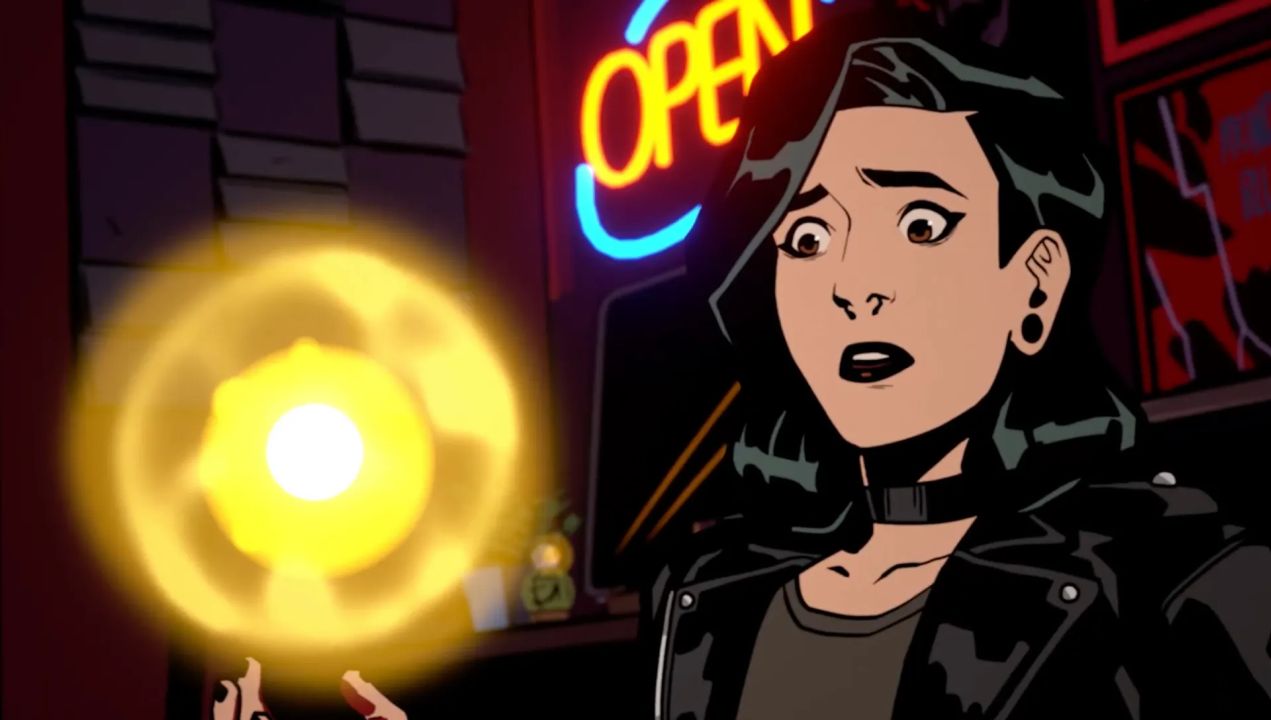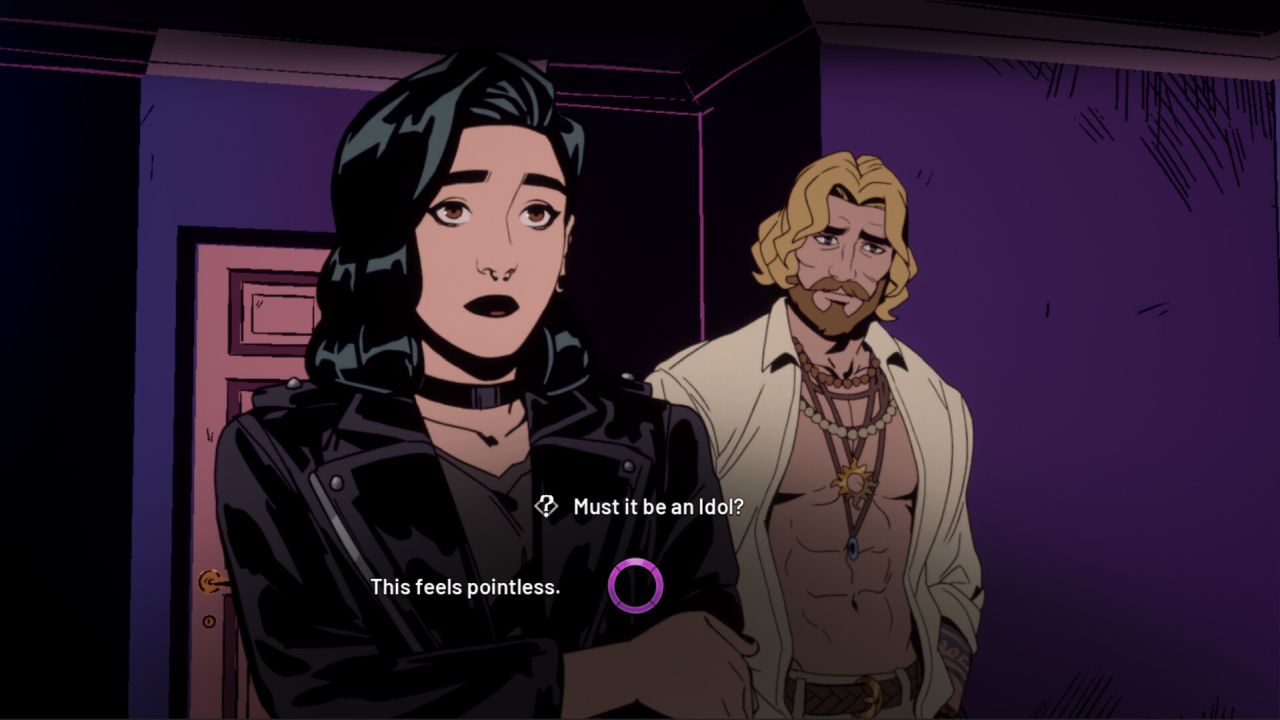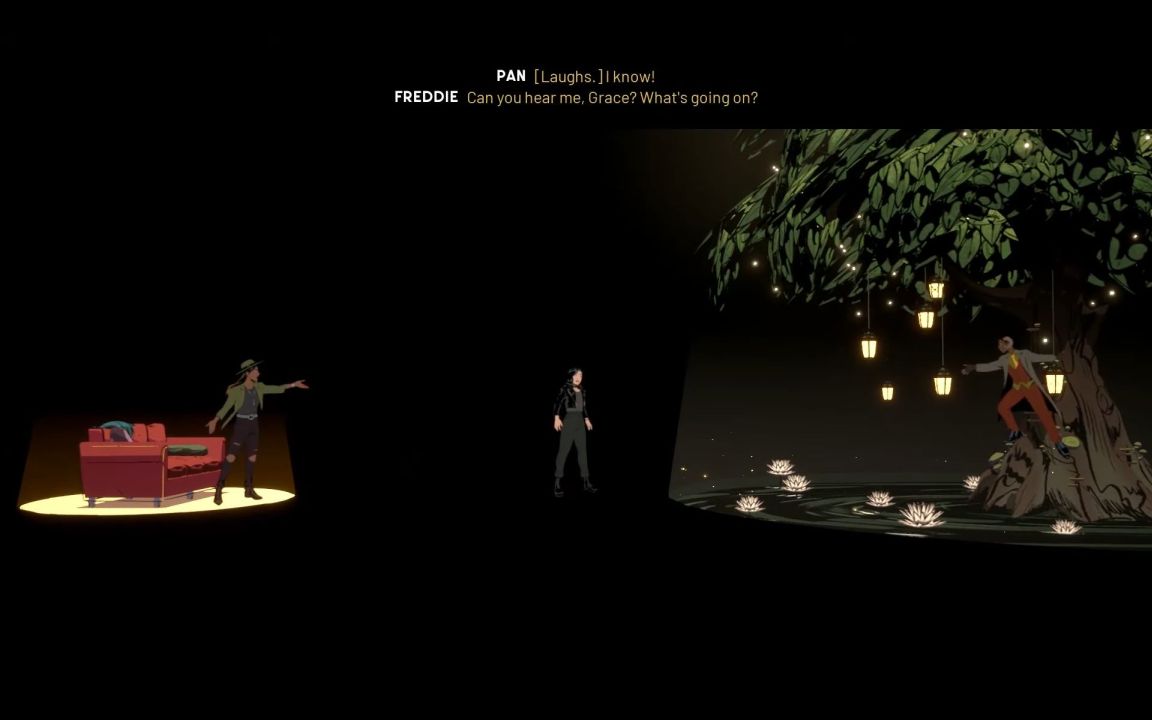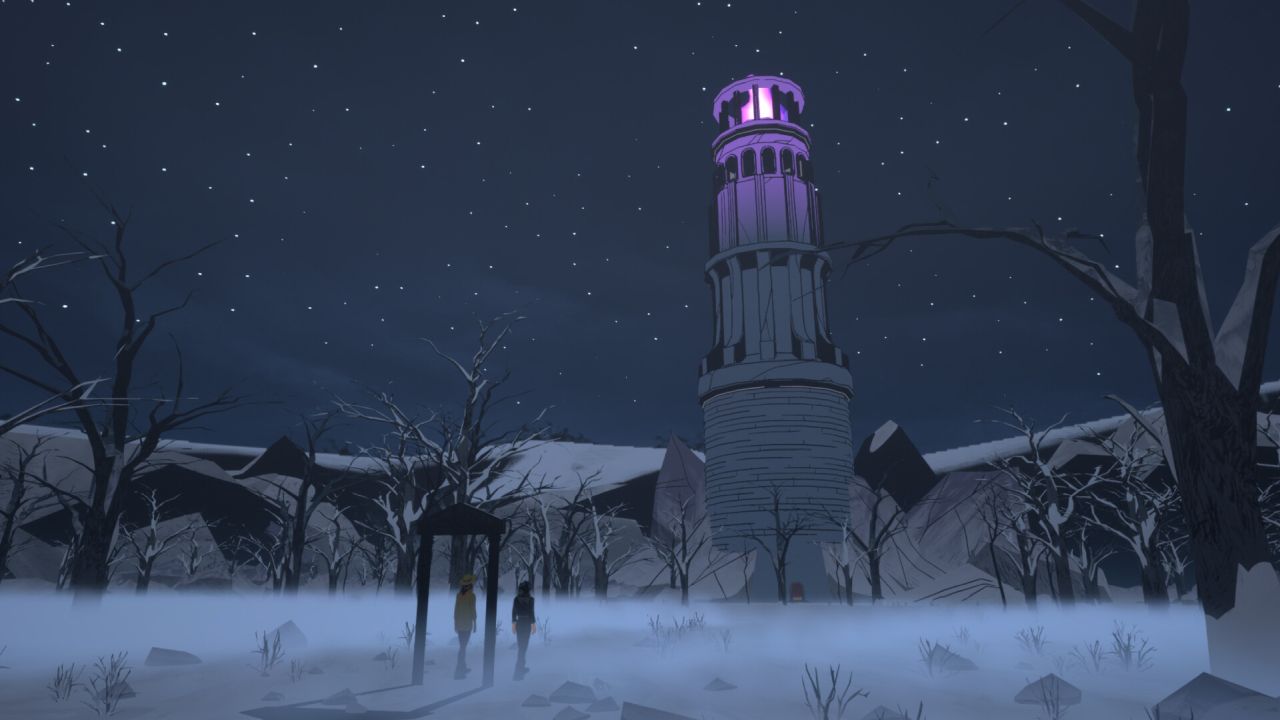Stray Gods: The Roleplaying Musical Review
In search of a new audience
Narrative adventure games are a common sight these days, following the breakthrough success of the Telltale adventures nearly a decade ago. But the genre has hit a rough patch, with many games releasing and failing to either tell a compelling story, or provide any worthwhile interactivity. The debut and initially crowd-funded effort from developer Summerfall Studios, Stray Gods: The Roleplaying Musical looks to change the game, as they say. This 2D narrative adventure not only hopes to entice players with its mythical setting and a murder mystery, but also woo them with interactive musical numbers. While this idea is grand in theory, the final curtain falls with subdued applause.

The game follows a young singer named Grace, who is holding auditions for a new member in her band. She feels a bit lost in her path in life as a person and an artist, but things quickly change after a mysterious woman attends the audition. Not long after, that same woman rushes into Grace's apartment injured and dies in her arms, without saying why – and an object of power transfers into Grace. Without having a moment to think, another young person appears in the doorway and whisks her away to face judgement in front of a council. But this council are not mere mortals – they are apparently ancient Greek Gods that have been living among us for generations. It turns out that the young dead woman was Calliope, the last surviving Muse. Upon death, her powers and spirit moved to Grace, but the Gods believe that Grace was the killer and want to execute her as well. The vote is not unanimous – Apollo intervenes and wants to give Grace a chance to prove her innocence. Reluctantly, the leader Athena agrees and gives a week deadline before the full trial is to commence.
There's no actual urgency though, despite the supposed one week deadline, as you'll be able to progress through every conversation and location available. Stray Gods has a decently strong opening that hooks you into a murder mystery, as Grace visits various locations around town and interacts with different Gods to try and piece together what happened to Calliope that night. You'll meet a variety of good characters across the journey, such as the moody Apollo, strong headed Persephone, coy Pan, and even the hostile Medusa. The game also does a good job of keeping track of which character knows what, so if you visit someone first, you can tell the others later about what you've learned.
One of the game's strongest aspects is how well-realized this setting is. Each location has you focus on a specific character that may hold the answers, but the focus is really more on learning about the Gods and how they've survived and evolved over the millennia of living alongside mortals. The adventure focuses on slow paced discussions between characters, with plenty of optional conversations that reveal more about the world, which are all surprisingly engaging. There are such interesting concepts in play – such as the fact that they may choose to die and pass on their soul to the next person, like it happened to Grace; and if nobody is around, their soul may vanish completely. Over time, all of their memories return and for some that may be too painful; transferring to a new successor lets them forget their past for a while – but for the new host, their own memories begin to fade. The Gods have powers, but that's not really what the lore is about. In this regard, some positive comparisons can be made to The Wolf Among Us and its well-crafted world that combines myth and reality.

This is a fairly typical modern adventure game, where players will make occasional choices. Those choices include which locations to visit first, and thus who you speak with. You'll also make dialogue choices, including some optional ones if you wish to delve deeper into the lore. There are no timers for responses to worry about, which is always a refreshing change (except for one case which we'll touch on later). At the start of the game, players will get to choose a personality type for Grace – Kickass, Charming, or Clever – which unlocks the occasional special dialogue option that leans further into a particular personality type.
Sadly, despite the intriguing premise and excellent lore, the main story falls entirely flat. Each character that Grace comes across has interesting scenarios, but each feels very standalone, and only connects to the main story at the end when they decide to dump some relevant information on you. While you can learn tons about the world and the characters, uncover new clues that feel important, and reveal critical information (or choose not to) to other characters, none of it really matters. You can complete the entire game without asking any questions, and things always end up the same. The murder mystery concept ends with a completely disappointing outcome because players have no agency over it; Grace solves nothing in the end.
The concept of player choice is really an illusion to a story that has very few points of flexibility. Sure, the fates of individual characters may be different, but they are entirely self-contained, with the main narrative always having the same outcome, no matter how you progress or what choices you make. You can complete the finale without even touching the controller to make any choices, and it affects little. The concept of the three personality types and the extra dialogue options they unlock also have zero bearing on how the main story plays out – only in some cases, it may affect how a specific scene or character fate ends up.You even get to select a second personality type fairly randomly in the later stages of the game, which seems to serve little purpose. There's really only one major alternate ending that affects things – if there is a sequel. Those looking for an adventure where choices matter, or even one that has a good central story, won't find it here.
The lack of major choice and consequence also puts a damper on replay value, as while you may want to see how a couple of scenarios can play out differently, the overall story doesn't change. There is an optional romance element with a few characters, but again it feels standalone and very tacked-on. The game takes about 6 hours to complete, with future attempts being extremely quick thanks to the ability to skip all conversations and go directly to the next choice. But perhaps the main reason you'll want to replay the game is to see the different versions of the songs.

Yes, as the name suggests, Stray Gods is indeed a musical. As Grace is a Muse, she has a power to engage others in song; it's not a choice gameplay mechanic – the musical numbers happen as the story dictates. If memory serves, this is the first time ever that anyone has had to evaluate original music, lyrics, and vocals in a game review. And while music is one of the most subjective art forms around, Stray Gods just doesn't quite get it right. It's less Broadway, and more high school musical theater. It's certainly not up to the likes of The Greatest Showman or The CW's Crazy Ex-Girlfriend; few would be interested in the official soundtrack CD for this game. There was always going to be a big risk in trying something so new to the video game space, and unfortunately it doesn't work out.
That's not to say the actors don't give it their all. The cast is stacked by well-known voice performers, with Laura Bailey as Grace, Troy Baker as Apollo, Ashley Johnson as Calliope, and Mary Elizabeth McGlynn as Persephone. But while they do great voice work, and the game's casual and occasionally humor-infused dialogue serves it well, their singing ability is maybe not always consistent. It would have perhaps made more sense to hire actual singers for most of the roles. Laura Bailey manages to strongly carry the lead, but even so she only has the disappointing music and lyrics to work with.
Stray Gods does not feature the more traditional songs that you'd find in modern crowd-pleasing musicals, but rather a collection of stitched-together musical arrangements. Here again, the developers involved a well-known video game composer Austin Wintory, but he struggles to create more than one cohesive song, and is perhaps in a bit over his head. Almost all of the musical numbers constantly change their flow, with a variety of different lyric styles, tempos, and arrangements stumbling all over each other. This most often results in, quite frankly, a mess. The artistic attempts where multiple vocalists try to sing over each other never work either. Most of the tracks are just spoken dialogue (often without even bothering to rhyme), often delivered off-beat to the music itself. There are some sections that work, but they are few and far between in the 20-odd songs list.
It is possible that the gameplay design is to blame for the music sounding so extremely disjoined and unsatisfying. The developers decided to take an even bigger risk, and not just made this a musical, but one where players can affect the songs - but the end result doesn't hold a candle to something like Fuser. During each musical number, Grace can affect the upcoming lyrics and mood of the music by making choices - this is the choice type that has a timer (though it can be turned off). But the concept is just far too ambitious. It probably wasn't even worth it – the music and the lyrics are not that good that you'd want to hear all possible verses, and from a gameplay perspective it doesn't even align with the lore. We are told that Grace cannot directly control others with her powers, and yet many choices you make dictate what and how others will sing about. And you always have all three options available, regardless of which persona you actually aligned with which restricts your dialogue options elsewhere. Stray Gods gets points for originality and trying something really new in the video game space, but the end result isn't great.

Visually, the game successfully adopts a comic book-like art style, and the character designs are decent, if not overly detailed. The 2D scenes are intermittently animated, a sort of "motion-comic" style where characters move through different expressions and positions through still images swaps – while it looks decent, you may wish they were fully animated. The backgrounds also suffer from serious lack of detail, and in certain scenes when the camera is up close, you are looking at very low resolution assets. You won't really visit any hugely memorable settings, but the game often dives into some mildly surreal imagery during the musical numbers. Elsewhere, the choice selection wheel feels oddly sluggish throughout. We also ran into an issue where the volume of the dialogue fluctuated wildly depending on scene and character speaking. The game loads quickly and there were no other major issues, though.
Stray Gods: The Roleplaying Musical gets big props for originality and trying to create something new. It features a number of characters that are interesting to talk to, and a lore that's surprisingly well-realized and balances mythology and the real world nicely. And while the dialogue writing and voice acting is good, the musical elements feel entirely uneven and rough. The musical numbers are very rigid and chopped up into bits, and perhaps trying to shove in player choice is to blame. Player choices aren't even worth it anyway, as they carry little impact to the main story and outcome. It's a nice looking game, but the static comic page approach to animation sucks some of the life out of the musical. Though initially very promising, Stray Gods: The Roleplaying Musical falls victim to its own grand ambitions.
 Comments
Comments













